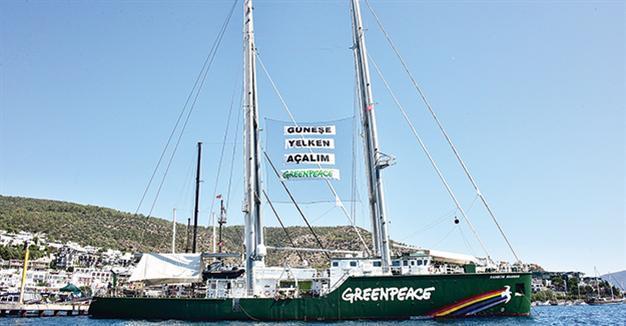Greenpeace campaigns for solar panels on Turkish roofs
Nazlan Ertan – BODRUM

AA photo
The Rainbow Warrior, the legendary boat of the international environmentalist group Greenpeace, arrived in Turkey this week on a three-stop tour for its campaign “Sail to the Sun,” which aims to increase the use of solar energy in Turkey.The campaign aims to create public awareness on the benefits of solar energy for Turkey and is urging the installation of solar panels on 1 million roofs.
“This is not a dream,” said Duygu Kutluay, a long-time activist for the environment who is responsible for the group’s Climate and Energy campaign in the Mediterranean. Kutluay and Ansgar Kiene, the team leader for Climate and Energy, have brought the Rainbow Warrior to Turkey for an ambitious awareness-rising tour.
“Turkey has a great potential that would make the country a leader in the use of clean, renewable resources, such as solar energy,” said Kutluay as the Rainbow Warrior started its tour of Turkey on Sept. 6 in Bodrum.
Bodrum Mayor Mehmet Kocadon, who visited the boat, said he was happy to see that the Rainbow Warrior had chosen Bodrum, “a sunny and environmentally conscious city” to start its Sail to Sun campaign.
“Come again next year, to join or to simply accompany our annual sailing race,” he told the ship’s captain, Peter Willcox, who was arrested 21 years ago in Turkey during a Greenpeace activity.
Bodrum loves the Rainbow Warrior
The arrival of the boat has elicited great interest among the local public as well. The 16-member crew, which consisted of 14 different nationalities, including two Turkish volunteers, showed the people around the boat in open-day activities.
The vessel is the third Rainbow Warrior, following in the footsteps of the first that was sunk by the French intelligence service in 1985 as the ship was on its way to protest against a French nuclear test in the Pacific.
“The second ship, which was acquired by Greenpeace in the 1980s, is now used as a ship boat in Bangladesh and the present Rainbow Warrior III is a multi-purpose boat that was designed specifically for us and used in the last five years,” said Willcox.
The boat is reportedly the greenest ship on the sea, which runs on wind power 80 percent of the time. It desalinizes seawater for its daily water needs and boasts that everything on the ship – from elements of decoration to the construction of its heliport – has been sourced in transparent ethical trade.
“I have been in Turkey three times before and got arrested 21 years ago during a Greenpeace action,” said Willcox. He has been with Greenpeace since 1984 and now, at the age of 63, is almost as famous as the boat. He was on the first boat that was attacked by the French – resulting in the death of Dutch-Portuguese photographer Fernando Pereira, spent two months in detention in Russia as a member of Arctic 30 and published a book on his experience earlier this year.
“My crew are activists first, sailors second,” he said, but it is easy to see that he is the final authority on the boat.
Solar panels on hotels and public buildings
In Bodrum, Greenpeace held a mini-workshop that brought together the tourism sectors with International Solar Energy Society Turkey Secretary-General Faruk Telemcioğlu and explore ways to convince hotels to use solar panels.
“Turkey enjoys an average of 2,700 hours of sun a year; that makes the country the second sunniest in Europe,” said Telemcioğlu. “The new regulations aim at encouraging small and medium enterprises to generate electricity for their own use through solar energy systems and sell the surplus back to the state.
These have some gaps at the time being but these will be overcome in time. The costs of the solar energy systems have been made cheaper and the state guarantees that it will buy the surplus electricity.”
But tourism operators, who are experiencing a major bad season, maintained that they need more subsidies and benefits to launch the solar initiative – as well as more information about how it can be done and what benefits it would bring – either financially or in terms of attracting a wider net of tourists.
According to Kutluay and Kiene, the benefits would include not only environmental sustainability but solid economic benefits. “We can contribute to the energy independence of the country, help reduce the GDP gap and also earn money for our own enterprise by reducing costs and earn money by selling the electric surplus. Plus, we’d do our share of helping environmental sustainability,” Kutluay said.
Kiene also underlined that a new, environmentally aware tourist base was developing that preferred hotels that did not pollute the environment.
The Rainbow Warrior will continue to Seferihisar, İzmir, to hold talks with municipalities on promoting solar energy before concluding its tour in Istanbul.
















